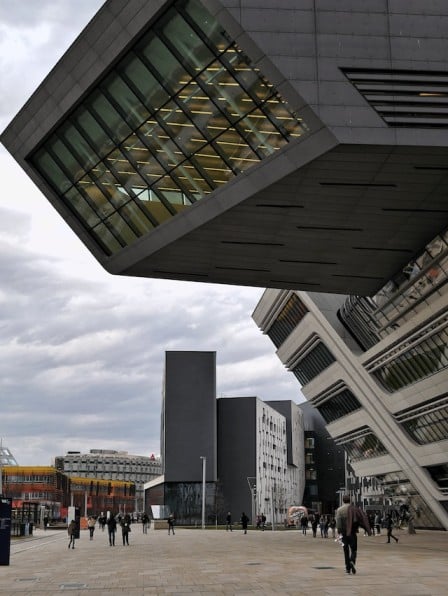Famous for its castles, palaces, and architecture, Austria is on the bucket list of many travelers. While the country is known for its incredible ski slopes and hiking trails, the castles built during the Habsburg reign are some of the most impressive in Europe and will transport you back in time.
The capital, Vienna, boasts more than 100 museums. Art lovers, history fanatics, and foodies will each be captivated by the city. If you are looking to secure an Austria residence permit to call the country your home, then the process can be a little trickier than in other countries – however, it is certainly doable.
Immigration to Austria has become increasingly popular in recent years, with the number of people interested in securing a residence permit tripling over the past five years. And given the many attractions of moving to the country, this is not too surprising. Austria is one of the safest places in the world, ranking in fifth position in the Global Peace Index 2022 and providing excellent infrastructure, healthcare, education, and business opportunities. Vienna, in particular, is often picked out as one of the world’s most liveable cities.
Austria is located in the heart of Europe, bordering eight other European countries, Germany, the Czech Republic, Hungary, Italy, Slovenia, Slovakia, Switzerland, and Lichtenstein. It’s strategic location makes it incredibly easy to travel around the continent – and further abroad. The country is an EU member state, and German is spoken here. If you are looking to move to Austria, most people will speak English, but it’s certainly worth learning the German language.
In this article, we’ll guide you through getting a residence permit in Austria, whether you are an entrepreneur, student, scientist, or are interested in moving to the country through with family reunification – plus much more besides.
The Main Ways of Obtaining a Residence Permit in Austria
A residence permit is a document that allows individuals to reside in a country. In Austria, you can secure a residence permit in the following ways:
- You are financially independent
- Through employment
- Through enrollment in a university or studying in Austria
- Through family unification
- By opening a company
In the below sections, we will provide you with an overview of the main ways that you can secure an Austrian residence permit.
How to Obtain a Residence Permit for Financially Independent People
If you are a non-EU, non-EEA, or non-Swiss financially independent or a pensioner and you do not intend to work in Austria, then this is the best route for you. This residence permit – also called a Settlement Visa – may be granted if:
- The applicant fulfills the general requirements for granting a residence permit
- The quota under the quota system is available – only a limited number of this settlement permit can be granted per year
- They have a regular monthly income (e.g., foreign or Austrian pension, profits from enterprises abroad, savings, company shares, etc.) that amounts to the following:
- Single person: €2,220.52 per month
- Married couple or couple in a registered partnership: €3,503.12 per month.
- Each child: €342.62 per month
If you are contemplating retiring to Austria, for example, out of all the Austria residence permit types, this option is probably the best suited to you.
How to Obtain a Residence Permit for Entrepreneurs
For entrepreneurs, you can apply for a Red-White-Red Card (more information on this later in the article). You will need to ensure you fulfill the following:
- Establish a company to develop and launch an innovative product, service, processing method, or technology and, to this end, submit a business plan for the establishment and maintenance of the company
- You personally exert controlling influence on the management of the new company
- You prove capital for the company to be founded, amounting to a minimum of €30,000, with an equity of at least 50 percent
- You can score a minimum of 50 points in the following criteria in the table below:
Entrepreneurs and Start-Up Founders Requirements | Points |
Qualification | Maximum points available (30) |
Completed vocational education, training, know-how, skills in prospective occupation | 20 |
Completed a program of a minimum duration of three years at a tertiary education institution | 20 |
Completed a diploma (Bachelor, Master, or Doctor degree program) or vocational training or education in Austria | 30 |
Work experience (according to qualification) | Maximum points available (10) |
Work experience (per half-year) | 1 |
Language proficiency | Maximum points available (15) |
A2 level German | 5 |
B1-B2 level German | 10 |
B2 level English | 10 |
C1-C2 level German | 15 |
Bonus points | Maximum points available (30) |
Evidence of additional investment of a minimum of €50,000 | 10 |
Admission to a business incubator or funding by a start-up funding agency in Austria | 10 |
Age up to 35 years old | 10 |
Total of maximum points available | 85 |
Required minimum | 50 |
This table runs of specific criteria that make you eligible to obtain a Red-White-Red Card.
How to Get an Austrian Residence Permit Through Employment
Non-EU foreign nationals looking to work in Austria can apply for a Red-White-Red Card. The card allows you to live in Austria for 24 months, but during this time, you can only work for the employer specified in your application. After this period, this card can be extended for a further three years without reference to a specific job. After five years, you can secure permanent residence.
Who is considered for a Red-White-Red Card?
- Very highly qualified workers
- Skilled workers in occupations with shortages
- Start-up founders (as mentioned previously)
- Self-employed key workers
- Graduates of Austrian Universities and Colleges of Higher Education
- Other key workers
How to Get an Austrian Residence Permit for Highly Qualified, Key Specialists and Representatives of Rare Professions
If you are a highly qualified specialist, a key specialist in a particular field, or a representative of a rare profession looking to move to Austria, then you can apply for a Red-White-Red Card after you have legally entered the county. For example, you can enter Austria under a Job Seeker Visa to look for work in the country, or you can apply for this card in an Austrian Embassy or Austrian Consulate in your home country, provided you have received an offer of employment. You can always speak with the Austrian Embassy in your home country for more information about your specific case if required.
If you are looking to apply for a Red-White-Red Card, you will also need to reach a maximum amount of points. For example, if you are a very highly skilled qualified worker, you will need to reach a maximum of 70 points. You can find out more here.


How to Get a Residence Permit for Graduates of Austrian Universities
Many graduates of universities in Austria plan to stay in the country to work. If you have successfully completed your studies and are a third-country national, you can renew your residence permit for a twelve-month period with the purpose of searching for employment – or even starting a business – provided that you fulfill all the requirements under the Austrian residence law. This will include having sufficient means of sustaining yourself in the country, that you have valid health insurance, etc.
Red-White-Red Card for graduates
During these twelve months, when you are seeking employment in Austria, if you receive a job offer from a specified employer (employment contract) that matches your qualification, then you can apply for a Red-White-Red Card without a labor market test.
You will need to fulfill the following requirements:
- You get paid the locally customary gross minimum salary that comparable Austrian graduates would be paid (junior employees)
- You fulfill the general requirements under Austrian settlement and residence law. For example, you have valid health insurance.
For graduates, there is no points system, and the Red-White-Red Card allows you to settle in Austria on a temporary basis and work for the employer that is specified in the application.
You can also apply for the Red-White-Red Card Plus for graduates, where you can enjoy unlimited market access. You will need to have been employed for at least 21 months during the past two years in order to be eligible for the Red-White-Red Card Plus.
The Austrian Residence Permit for Scientists and Researchers
To obtain a residence permit in Austria as a scientist or researcher, an official proposal from an Austrian research organization should suffice. You will need to apply for a “Settlement – Research” Permit at the local residence authority in the country after lawful entry and stay in the country.
The application process can be slightly complicated. To learn more about this residence permit, you can consult the Agency for Education and Internationalisation’s website here.
The Austrian Residence Permit for Artists
Even for artists, you will need to have an employment contract, which can make it tricky to secure residence in Austria. You will only be issued a residence permit based on an agreement with an Austrian organization that has invited you to create works of art in Austria. The residence permit card, in this case, is renewable while the contract is within its validity period.
How to Get a Residence Permit in Austria for Contract Work
If you are looking to secure long-term residence in Austria, then this is not the most suitable option for you. You will be required to have a contract with an inviting party to conduct specified work, such as providing a masterclass.
This residence permit has a validity period of six or 12 months and cannot be extended. You can secure this visa if you have a clean criminal record and a minimum income of €883 per month, provided you do not violate the visa regime.
How to Get an Austrian Residence Permit for a Business Trip
If you need to enter Austria for business for more than three months. You will need to obtain a special permit from the Austrian employment office and issue a contract or travel ticket with the inviting party. The validity of a residence permit for a business trip will depend on the terms of the contract.
How to Get a Residence Permit in Austria for Volunteers
This residence permit is only suitable if you are a non-EU, non-EEA, or non-Swiss citizen that is looking to work for a social non-profit organization. You will need to have an official invitation from this organization.
How to Get a Residence Permit to Study at an Austrian University
In Austria, a student residence permit allows you to study full-time. This residence permit, “Residence Permit – Student,” is meant for third-country nationals that have been admitted to study at a higher education institute in Austria. For example, if you have been accepted at an accredited private university, you should apply for this residency permit to secure Austrian residence. You can find more details on the Austria Residence permit for students here.
How to Obtain a Residence Permit in Austria through Family Reunification
If you are a non-EU, non-EEA, or non-Swiss citizen and you intend to reside or settle in Austria for a period of more than six months if you have a family member in the country, then you will require an Austrian residence permit. For stays up to six months, you can apply for a visa, if necessary.
Under the Residency and Settlement Act, family members can be a spouse, registered partner, or unmarried minors, including adoptive and stepchildren. Note that spouses and registered partners need to be 21 years of age or older to apply for and secure Austrian residence.

The European Blue Card (EU Blue Card)
As a third-country citizen, you may be eligible for the EU Blue Card (Blaue Karte). The Austria residence permit requirements for the EU Blue Card are as follows:
- You have completed a course of study at a university or other tertiary education system with a minimum duration of three years (for Information and Communication Technology (ICT) professionals and service managers, proof of three years of experience will suffice if it is deemed the equivalent to a three-year university degree program). This proof has to have been acquired within the last seven years before your application is submitted.
- You have a binding job offer that provides you with employment for at least six months, and the employment corresponds to your education
- You will earn at least €45,595 per year (the average gross annual income of full-time employers in 2023), plus special payments
- The Austrian labor market test (Arbeitsmarktprüfung) shows that there is no equally qualified worker that is registered with the Public Employment Service (AMS) that is able to carry out this form of employment.
There is no points system for this visa type. An EU Blue Card is also applicable to individuals entitled to asylum or subsidiary protection in the country.
Global Citizen Solutions: Who We Are and How We Can Help You
Global Citizen Solutions is a boutique migration consultancy firm focused on finding the right relocation, residency or citizenship by investment program for individuals wishing to secure their future and become global citizens. If you want to apply for a residency by investment (RBI) or citizenship by investment (CBI) program but are still determining which program is for you, we are here to help.
If you are considering applying to a CBI program, you will be pleased to know that Austria has its very own scheme. For more information, you can read our article: Austria Citizenship by Investment: The Ultimate Guide by Experts. Note that, regarding Austrian citizenship, the country does not allow dual citizenship, meaning that you would need to relinquish your current passport
The Austrian passport is considered the 19th strongest passport in the world, according to our innovative Global Passport Index. You can read more about the passport advantages of Austrian citizens here: Austria’s country page on our Global Passport Index.
Austria also offers a residency by investment program. For an investment in Austria of €40,000, you can secure residency in the country, provided you fulfill all the requirements.
The following materials may also be of interest to you.
- Golden Passport Countries and Their Investment Requirements
- Citizenship by Investment Countries List and Guide 2023
- Austrian Passport – A Helpful Guide
For further information from the Austrian government, you can consult their website here for further information.
Frequently Asked Questions about Obtaining an Austrian Residence Permit
Is it easy to get permanent residency in Austria?
Seeking permanent residency in Austria is possible – and there are several options on the table to temporarily reside in Austria, such as the Red-White-Red Card and the EU Blue Card. After you have legally resided in Austria for five uninterrupted years, and provided you meet a number of other requirements, you should be able to apply for an Austrian residence permit.
How long does it take to get a residence permit in Austria?
After you have lodged your application, securing a residence permit usually takes around three months. Ensure you have all your documents, get medical insurance, find a place to rent in the country, and sign the rental agreement. Also, when it comes to residence permits, there are several options. Make sure you apply for the one that corresponds to your personal situation.
When moving to Austria, it is worth opening a bank account to avoid transaction fees. You will need to ensure you have all the required documents when opening an Austrian bank account.
What are the different types of Austrian residence permits?
There are many different types of Austrian residence permits, including the Red-White-Red Card, a residence permit for family reunification, specialized workers, business trips, and so on. You will need to ensure you have the correct residence permit if you are looking to relocate to Austria. Ensure you are aware of the required documents that you will need to present.
How much does it cost to get permanent residence in Austria?
You will need to have a regular and fixed personal income that enables you to cover your living costs without having to resort to the Austrian welfare system.
As of 1 January 2023, the rates are as follows:
- For single persons: €1,110.26
- For a couple: €1,751.56
- For each additional child: €171.31
How can I get an Austrian residence permit?
There are many ways to obtain a residence permit for third country nationals who wish to to stay in Austria. Options include having secured work in Austria, being enrolled in a university, having family members already living in Austria, or being a highly skilled professional. There are other requirements, such as having valid health insurance.
Do I need a residence permit in Austria as an EU citizen?
EU citizens are not required to have a visa to stay in Austria for up to three months. After three months, you should apply for a registration certificate (Anmeldebescheinigung), and you will need to prove that you have adequate means of subsistence or that you are attending an Austrian educational institute.


